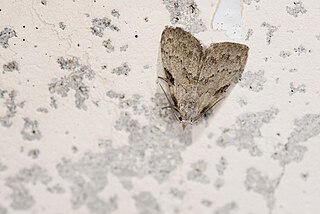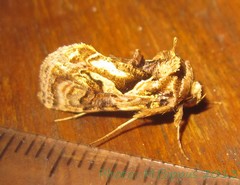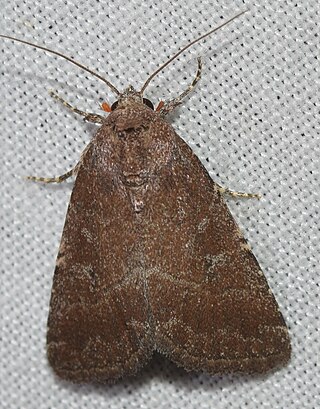Related Research Articles

Callopistria maillardi is a moth of the family Noctuidae. The species can be found throughout central, eastern and southern Africa, including the islands of the Indian Ocean, Yemen, Chagos islands, Pakistan, India, Sri Lanka, southern China, in Hawaii, Hong Kong, New Zealand, the Society Islands, Sulawesi, as well as Queensland in Australia.

Manoba is a genus of moths in the family Nolidae. The genus was first described by Francis Walker in 1863.

Sergiusia is a monotypic moth genus of the family Noctuidae described by Nye in 1980. Its only species, Sergiusia pentelia, was described by Herbert Druce in 1887. It is known from Mozambique.
Attatha metaleuca is a moth of the family Noctuidae first described by George Hampson in 1913. It is found in Burkina Faso, Ivory Coast, Eritrea, Ethiopia, Mauritania, Nigeria, Saudi Arabia, Tanzania, Togo and Yemen.
Parachalciope binaria is a moth of the family Noctuidae first described by William Jacob Holland in 1894. It is found in the Democratic Republic of the Congo, Gabon, Nigeria, Uganda and Cameroon.
Parachalciope inornata is a moth of the family Noctuidae first described by William Jacob Holland in 1894. It is found in the Democratic Republic of the Congo, Ghana and Gabon.

Diaphone eumela, the cherry spot or lily borer, is a moth of the family Noctuidae. It is found in Lesotho, Mozambique, Namibia, South Africa and Angola.
Maliattha blandula is a species of moth in the family Noctuidae first described by Achille Guenée in 1862. It is found in Tanzania, Madagascar, Mauritius, Réunion and the Comoros. It was placed in the genus Maliattha in 2016.

Athetis ignava is a moth of the family Noctuidae. It is found in Southern and Eastern Africa, including the islands of the Indian Ocean.

Leucania insulicola is a species of moth of the family Noctuidae. It is found in most parts of central, western and southern Africa and on the islands of the Indian Ocean.

Ctenoplusia dorfmeisteri is a moth of the family Noctuidae. It is found in western, central and southern Africa, where it's known from Congo, Nigeria, Gabon, Ghana, South Africa, Mauritius, Réunion and from Yemen.
Acontia gloriosa is a moth of the family Noctuidae. It was first described by George Hamilton Kenrick in 1917 and is found in Madagascar.
Cerynea tetramelanosticta is a species of moth of the family Erebidae first described by Emilio Berio in 1954. It is found in Tanzania and in Mauritius.

Rothia rhaeo is a moth of the family Noctuidae first described by Herbert Druce in 1894. This moth occurs in Madagascar, Uganda and in South Africa.
Rothia arrosa is a moth of the family Noctuidae. This moth occurs in Madagascar.
Honeyia is a genus of moths of the family Erebidae. The genus was erected by Hermann Heinrich Hacker and Michael Fibiger in 2007.

Feliniopsis africana is a moth of the family Noctuidae described by William Schaus and W. G. Clements in 1893.

Heraclia gruenbergi is a species of moth of the family Noctuidae. It is found in Kenya, Uganda and Congo.

Mythimna prominens is a moth of the family Noctuidae. It was described by Francis Walker in 1856. It is found on Malta and in Greece, France, the Iberian Peninsula and Italy. Outside of Europe, it is found in Morocco, the Republic of the Congo, the Democratic Republic of the Congo, Kenya, Réunion, Madagascar, Nigeria, South Africa and Zimbabwe.

Condica viscosa is a species of moth in the family Noctuidae. It was described by Christian Friedrich Freyer in 1831. It is found from southern Europe and North Africa to Arabia and the southern parts of western Asia. The habitat consists of lowland areas near the coast, including dry slopes, road side verges, dry river beds or fallow land.
References
- ↑ De Prins, J.; De Prins, W. (2017). "Phlegetonia catephioides Guenée, 1852". Afromoths. Retrieved November 15, 2017.
- ↑ Hacker, H. H. & Zilli, A. 2010. Revisional notes on the genus Thiacidas Walker, 1855 (= Trisula Moore, 1858, syn. nov.), new additional data on the Thiacidinae with descriptions of seven new species and two subspecies (Lepidoptera, Noctuidae). - Esperiana Memoir 5:413–432.